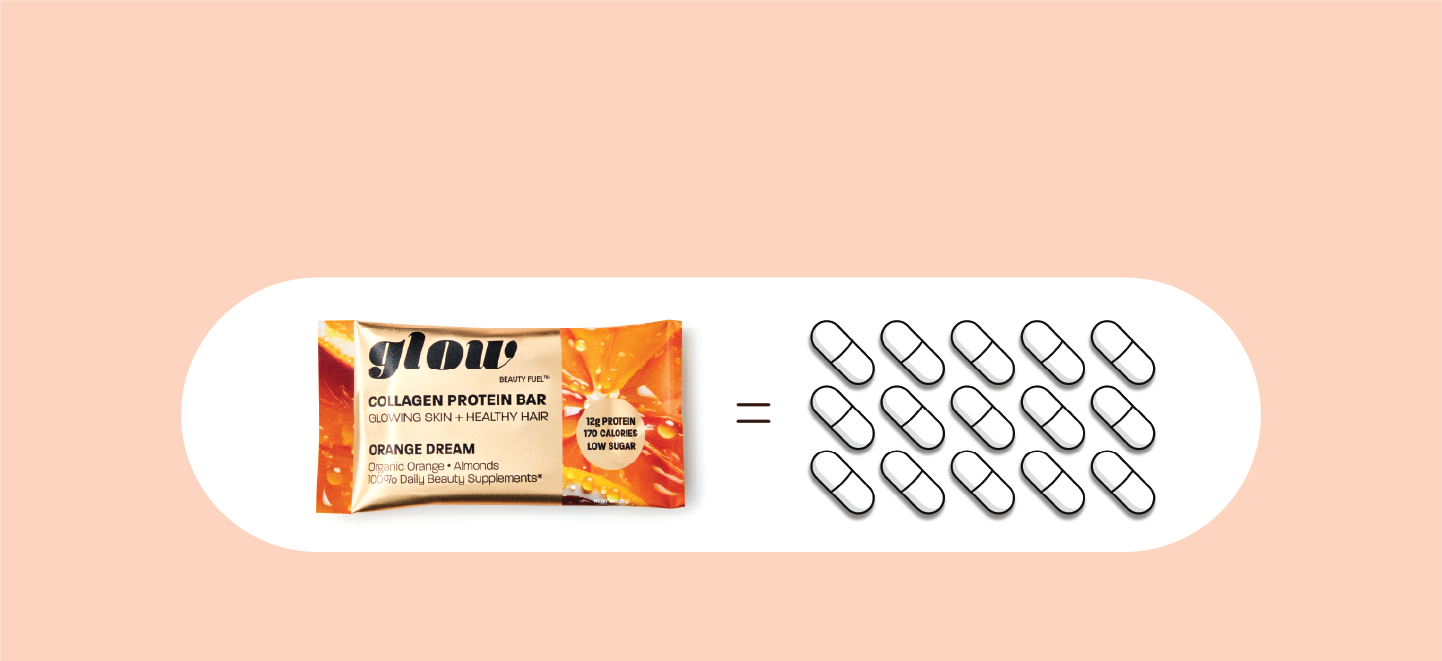More than 75% of the US adult population takes a dietary supplement for overall health and to fill nutrient gaps. And those interested in beauty from the inside out, may take up to 15 beauty supplement capsules per day!
15 capsules per day is a strong commitment and also can be a real pain in the neck- time consuming and inconvenient. That’s a lot of capsules to swallow each day or pack for a trip.
Glow Beauty Fuel bars are the only protein beauty bars to incorporate 100% of your daily beauty supplement needs. So, you can take your daily dose of all your beauty supplements in one scrumptious bar- what we promise to be the best tasting bar ever.
Here are the beauty supplements you are taking in ONE Glow Beauty Fuel bar:
- Unheated Collagen Peptides 6g./6000mg. Collagen is the connective tissue in every structure in our bodies. It is 1/3 of the entire body’s protein and makes up 70-80% of our skin. Our natural collagen production declines in our early 20’s and coupled with sun exposure, the diminishing collagen can cause skin to lose elasticity and moisture leading to fine lines and wrinkles. Less collagen means brittle nails and can lead to thinning dull hair. Wow and Yikes. So, supplementing with hydrolyzed unheated collagen peptides is a smart idea. Although there are no official daily dosing guidelines for collagen, Glow Beauty Fuel has followed the science by providing 6g/6000mg per bar plus synergistic supplements -explained below- to turbo-charge collagen’s effects. Learn more about collagen here.
- Hyaluronic Acid 120mg. Hyaluronic Acid (HA) is described as nature’s moisturizer and holds moisture like a sponge. It can hold up to 1000 times its weight in water! It is a beauty superstar that works with collagen to give you that luminous glow from within. Glow Beauty Fuel uses vegan HA which acts as a potent anti-inflammatory and anti-oxidant that protects the cells that produce collagen. Learn more about HA here.
- Hibiscus Flower Extract 400mg. Photo aging from UV light is one of the primary causes of external aging. We can decrease photo aging by ingesting hibiscus flower extract. It is another beauty superstar, neutralizing free radicals – a primary source of aging. It also effectively blocks the creation of melanin- which is the molecule responsible for uneven pigmentation and dark spots. Hibiscus Flower Extract helps to maintain skin elasticity and brightness. Learn more about Hibiscus Flower Extract here.
- Vitamin C 90mg./ 100% Daily Value. As we age, there is less Vitamin C found in our skin. Vitamin C is a required co-factor for the production of collagen and it increases collagen cross-linking to support strong skin, hair and nails. Vitamin C is also a potent anti-oxidant, neutralizing free radicals and limiting the damage cause by UV light. Glow Beauty Fuel bars provide 100% of the recommended daily Vitamin C requirement.
So, eat up one bar daily and literally feed your face (and your hair and your nails). Glow for it!
By Maren Jensen, Founder Glow Beauty Fuel




